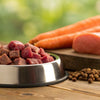Does Raw Dog Food Cause Diarrhea? Understanding the Risks and Solutions for Your Pup
- Houndsy
Table of Contents
- Introduction
- Understanding Diarrhea in Dogs
- Why Raw Dog Food May Cause Diarrhea
- Preventing Diarrhea When Feeding Raw
- What To Do If Your Dog Experiences Diarrhea
- Conclusion
Introduction
As devoted dog parents, we all want the best for our furry friends, especially when it comes to their diet. Did you know that around 15% to 25% of dogs are currently being fed some form of raw meat-based diet? While many pet parents find that a raw dog food diet offers health benefits, they also often encounter a common concern: does raw dog food cause diarrhea? The thought of our beloved companions experiencing any discomfort can be distressing, and at times, overwhelming.
This blog post serves to clarify the connection between raw dog food and diarrhea, assisting you in making informed dietary choices for your pet. By understanding the potential risks and the responsible methods of feeding a raw diet, we can enjoy happier, healthier dogs while minimizing digestive issues. Throughout this piece, we’ll dive into the reasons diarrhea may occur with raw feeding, how to transition correctly, and actionable steps to prevent potential gastrointestinal disturbances.
We’ll also reflect on how our daily feeding routines may need to adjust as we embark on this journey. Let’s get started by examining the various factors that may lead to diarrhea when feeding raw dog food.
Understanding Diarrhea in Dogs
Diarrhea is defined as abnormal or frequent bowel movements that are loose or watery. For our canine friends, it can be a signal that their diet needs adjustment or that something more serious might be at play. Understanding both acute and chronic diarrhea can help in diagnosing the issue effectively.
Acute vs. Chronic Diarrhea
-
Acute Diarrhea: This type occurs suddenly and is often short-lived. It might happen after a change in diet, a minor infection, or stress. Acute diarrhea often resolves on its own or with simple dietary adjustments.
-
Chronic Diarrhea: If your dog's diarrhea persists for more than a few days or keeps returning, it is classified as chronic. This may indicate underlying issues such as dietary intolerance, allergies, or more severe health concerns.
Signs to Watch For
Whether your dog is experiencing acute or chronic diarrhea, keep an eye on the following symptoms:
- Frequent, loose, or watery stools
- Vomiting
- Loss of appetite
- Lethargy
- Dehydration (look for dry gums or excessive thirst)
If any of these symptoms occur, it’s essential to consult with a veterinarian promptly.
Why Raw Dog Food May Cause Diarrhea
The shift to a raw dog food diet, typically comprising raw meat, bones, and organs, can be a double-edged sword. Here are the main reasons why it might lead to diarrhea in dogs:
1. Bacterial Contamination
Raw meats may harbor harmful bacteria such as Salmonella or E. coli, which can disrupt your dog’s digestive system. Although canines have a more robust digestive system than humans, ingesting contaminated food can still lead to diarrhea and other gastrointestinal issues.
2. Diet Transition
Switching your dog’s food abruptly can cause digestive upset. Most dogs require time to adapt to a new diet, and a sudden change from kibble to raw can overwhelm their digestive tract. Gradual transitions over a period of 7 to 10 days are recommended to allow the gut flora to adjust.
3. Imbalanced Nutritional Profile
Raw diets require careful formulation to ensure that dogs receive all essential nutrients. If there's an imbalance, such as too much organ meat or insufficient bone content, it can lead to digestive disturbances, including diarrhea.
4. Ingredient Sensitivities
Just like humans, dogs can have food sensitivities or allergies that result in diarrhea. If you're introducing a new protein not previously included in their diet, be mindful of any adverse reactions.
5. Improper Handling and Storage
Incorrect storage or handling of raw food can cause spoilage or contamination. Always handle raw food with clean utensils and wash your hands before and after preparation. It’s best to store raw meats in the freezer and thaw them in the refrigerator to avoid bacterial growth.
Preventing Diarrhea When Feeding Raw
Fortunately, cons ide rate of the issues that can arise with raw feeding, there are effective strategies we can implement to ensure our dogs remain healthy and happy.
1. Gradual Transition
If you're considering switching to a raw diet, be sure to introduce it gradually. Start with 75% old food and 25% raw food for the first few days, then slowly increase the ratio of raw food over time. This will help your dog's digestive system adapt to the new diet.
2. Quality Ingredients
Opt for high-quality meat sources from reputable suppliers. Poor-quality or contaminated sources increase the risk of bacterial infections. Ensure that the meats are fresh, and check for certifications from suppliers.
3. Balanced Nutritional Choices
Following a balanced feeding guideline can minimize the risk of nutritional imbalances. Ideally, a raw diet should incorporate:
- 70-80% muscle meat
- 10-15% bones (preferably raw)
- 5-10% organ meats (include a variety of organs)
Following such a guideline helps dogs receive the essential nutrients they need while preventing excessive fat or organ content, which can lead to diarrhea.
4. Monitor Their Reactions
Keep an eye on your dog's bowel movements as you introduce new foods. Document any changes and consult with your veterinarian if diarrhea persists or if they show other concerning symptoms.
5. Hygiene Practices
Proper hygiene is vital when dealing with raw meat, which inherently carries bacteria. Clean your dog’s feeding area regularly and always wash your hands and the utensils used for handling raw meat.
6. Hydration
Ensure that your pup remains hydrated, especially if diarrhea occurs. Fresh water should always be available. Consider incorporating wet food into their diet, which can provide extra hydration and support their digestive health.
What To Do If Your Dog Experiences Diarrhea
If your dog does develop diarrhea while on raw food, here's how we can help them:
-
Hydrate: Ensure your dog has access to fresh water to prevent dehydration.
-
Digestive Rest: Allow your dog's digestive system to rest. This might involve withholding food for 12 to 24 hours (considering age and health).
-
Reintroduce Food Slowly: Once the fasting period is over, bring back easily digestible foods like plain boiled chicken or rice before reintroducing their raw diet.
-
Veterinary Consultation: If symptoms of diarrhea continue after a few days or accompany severe symptoms like vomiting or lethargy, consult with a veterinarian for tailored advice and potential treatment options.
Conclusion
Feeding our dogs a raw food diet can offer significant health benefits if approached correctly. However, recognizing and understanding the potential issues surrounding raw feeding—particularly how it can contribute to diarrhea—is crucial for providing a balanced diet.
By transitioning carefully, ensuring high-quality ingredients, balancing nutrients, practicing good hygiene, and regularly monitoring your dog’s reactions to their diet, we can minimize the potential for gastrointestinal issues.
If you're ready to take your dog's feeding experience to the next level, consider exploring our flagship product, the Houndsy Kibble Dispenser. Not only does it ensure perfect portion control, but its modern design adds an aesthetic touch to your home while reducing mess.
FAQ
Q: Is it normal for my dog to have diarrhea when starting raw food?
A: Yes, some dogs may experience diarrhea during the transition phase as their digestive systems adjust. Gradually introducing raw food can help alleviate this.
Q: What should I do if my dog's diarrhea persists?
A: If your dog has diarrhea for more than 24-48 hours or shows other concerning symptoms such as vomiting or lethargy, consult your veterinarian for guidance.
Q: Can I feed my dog raw bones?
A: Yes, raw bones can be beneficial and help satisfy their chewing instincts. However, avoid cooked bones, as they can splinter and cause digestive problems.
Q: What ingredients should I avoid in a raw diet?
A: Avoid low-quality meats or ingredients, as these can cause digestive issues. Additionally, keep an eye out for any new protein sources your dog may be sensitive to.
Q: Are there any benefits to feeding raw dog food?
A: Many pet owners report improvements in their dog's coat health, energy levels, and overall digestion when switching to raw food, provided it is balanced and handled appropriately.












